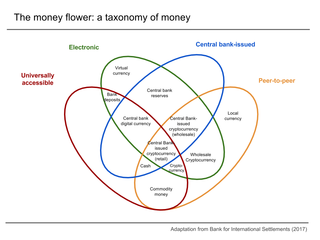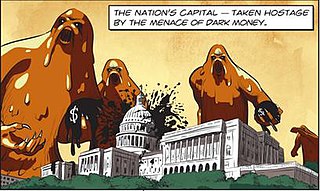Related Research Articles

Digital currency is any currency, money, or money-like asset that is primarily managed, stored or exchanged on digital computer systems, especially over the internet. Types of digital currencies include cryptocurrency, virtual currency and central bank digital currency. Digital currency may be recorded on a distributed database on the internet, a centralized electronic computer database owned by a company or bank, within digital files or even on a stored-value card.

The financing of electoral campaigns in the United States happens at the federal, state, and local levels by contributions from individuals, corporations, political action committees, and sometimes the government. Campaign spending has risen steadily at least since 1990.

Brock Jeffrey Pierce is an American entrepreneur known primarily for his work in the cryptocurrency industry. As a child actor, he starred in the Disney films The Mighty Ducks (1992), D2: The Mighty Ducks (1994), and First Kid (1996). He ran as an independent candidate in the 2020 United States presidential election.
Virtual currency, or virtual money, is a digital currency that is largely unregulated, issued and usually controlled by its developers, and used and accepted electronically among the members of a specific virtual community. In 2014, the European Banking Authority defined virtual currency as "a digital representation of value that is neither issued by a central bank or a public authority, nor necessarily attached to a fiat currency but is accepted by natural or legal persons as a means of payment and can be transferred, stored or traded electronically." A digital currency issued by a central bank is referred to as a central bank digital currency.

Bitcoin is the first decentralized cryptocurrency. Nodes in the bitcoin network verify transactions through cryptography and record them in a public distributed ledger called a blockchain. Based on a free market ideology, bitcoin was invented in 2008 by Satoshi Nakamoto, an unknown person.

In politics, particularly the politics of the United States, dark money refers to spending to influence elections, public policy, and political discourse, where the source of the money is not disclosed to the public.

A cryptocurrency, crypto-currency, or crypto is a digital currency designed to work as a medium of exchange through a computer network that is not reliant on any central authority, such as a government or bank, to uphold or maintain it. It is a decentralized system for verifying that the parties to a transaction have the money they claim to have, eliminating the need for traditional intermediaries, such as banks, when funds are being transferred between two entities.
The Bitcoin Foundation is an American organization that was formerly a nonprofit corporation. It was founded in September 2012 in an effort to restore the reputation of Bitcoin after several scandals, and to try to promote its development and uptake. The organization is modeled on the Linux Foundation and was funded mainly through grants made by for-profit companies that depend on the bitcoin technology.

Charles Shrem IV is an American entrepreneur and bitcoin advocate. He co-founded the now-defunct startup company BitInstant, and is a founding member of the Bitcoin Foundation. In 2014 he was sentenced to two years in prison for aiding and abetting the operation of an unlicensed money-transmitting business related to the Silk Road marketplace. He was released from prison in 2016. In 2017, he joined Jaxx and served as its chief operating officer, and founded cryptocurrency advisory CryptoIQ.
Blockchain.com is a cryptocurrency financial services company. The company began as the first Bitcoin blockchain explorer in 2011 and later created a cryptocurrency wallet that accounted for 28% of bitcoin transactions between 2012 and 2020. It also operates a cryptocurrency exchange and provides institutional markets lending business and data, charts, and analytics.

Stellar, or Stellar Lumens, is an open-source, decentralized protocol for digital currency to fiat money low-cost transfers which allows cross-border transactions between any pair of currencies. The Stellar protocol is supported by a Delaware nonprofit corporation, the Stellar Development Foundation, though this organization does not enjoy 501(c)(3) tax-exempt status with the IRS.
A blockchain is a distributed ledger with growing lists of records (blocks) that are securely linked together via cryptographic hashes. Each block contains a cryptographic hash of the previous block, a timestamp, and transaction data. Since each block contains information about the previous block, they effectively form a chain, with each additional block linking to the ones before it. Consequently, blockchain transactions are irreversible in that, once they are recorded, the data in any given block cannot be altered retroactively without altering all subsequent blocks.

Andreas M. Antonopoulos is a British-Greek Bitcoin advocate, tech entrepreneur, and author. He is a host on the Speaking of Bitcoin podcast and a teaching fellow for the M.Sc. Digital Currencies at the University of Nicosia.
Monero is a cryptocurrency which uses a blockchain with privacy-enhancing technologies to obfuscate transactions to achieve anonymity and fungibility. Observers cannot decipher addresses trading Monero, transaction amounts, address balances, or transaction histories.
United States virtual currency law is financial regulation as applied to transactions in virtual currency in the U.S. The Commodity Futures Trading Commission has regulated and may continue to regulate virtual currencies as commodities. The Securities and Exchange Commission also requires registration of any virtual currency traded in the U.S. if it is classified as a security and of any trading platform that meets its definition of an exchange.
Bitcoin was designed by its pseudonymous inventor, Satoshi Nakamoto, to work as a currency, but its status as a currency is disputed. Economists define money as a store of value, a medium of exchange and a unit of account, and agree that bitcoin does not currently meet all these criteria.
A cryptocurrency wallet is a device, physical medium, program or a service which stores the public and/or private keys for cryptocurrency transactions. In addition to this basic function of storing the keys, a cryptocurrency wallet more often offers the functionality of encrypting and/or signing information. Signing can for example result in executing a smart contract, a cryptocurrency transaction, identification, or legally signing a 'document'.
In blockchain, a fork is defined variously as:
Cryptocurrency and crime describe notable examples of cybercrime related to theft of cryptocurrencies and some methods or security vulnerabilities commonly exploited. Cryptojacking is a form of cybercrime specific to cryptocurrencies that have been used on websites to hijack a victim's resources and use them for hashing and mining cryptocurrency.
Wakefield Scott Stornetta is an American physicist and scientific researcher. His 1991 paper "How to Time-Stamp a Digital Document”, co-authored with Stuart Haber, won the 1992 Discover Award for Computer Software and is considered to be one of the most important papers in the development of cryptocurrencies.
References
- ↑ Anthony Cuthbertson (July 21, 2014). "Bitcoin Breakthrough as Chamber of Digital Commerce Opens in US". International Business Times UK.
- ↑ Megan R. Wilson (November 24, 2014). "Mellon joins bitcoin advocacy group". The Hill .
- ↑ Ian Allison (July 3, 2015). "Bitcoin regulation: Chamber of Digital Commerce talks about enlisting former JP Morgan chief Blythe Masters". International Business Times UK.
- ↑ "Blockchain Technology Gets a Hearing Inside the Fed's Headquarters".
- ↑ staff (October 16, 2014). "Chamber of Digital Commerce Receives IRS Recognition". Politics & Government Week. Archived from the original on April 9, 2016.
- ↑ "Board of Advisors". Chamber of Digital Commerce.
- ↑ staff (October 16, 2014). "Chamber of Digital Commerce Receives IRS Recognition". Politics & Government Week. Archived from the original on December 2, 2019. Retrieved December 2, 2019.
- ↑ Perianne Boring; Marc Kaufman (n.d.). "Blockchain: The Breakthrough Technology of the Decade and How China Is Leading the Way – An Industry White Paper" (PDF). Chamber of Digital Commerce. Retrieved 2 September 2022.
- ↑ Julian Hattem (August 25, 2014). "Bitcoin lobby launches spending PAC". The Hill .
- ↑ Julian Hattem (August 29, 2014). "Bitcoin group descends on Congress". The Hill .
- ↑ Brenan Salgado (September 5, 2014). "Bitcoin Education Day on Capitol Hill". Vanderbilt Journal of Entertainment & Technology Law. Vanderbilt Law School.
- ↑ Tess VandenDolder (August 24, 2014). "Politics News: The Bitcoin Lobby Has Launched Their Own PAC". DC Inno. Streetwise Media. Archived from the original on September 11, 2016. Retrieved August 13, 2016.
- ↑ "FEC Disclosure Report Search Results". docquery.fec.gov. Retrieved 2017-01-25.
- ↑ "FEC Disclosure Report Search Results". docquery.fec.gov. Retrieved 2017-01-25.